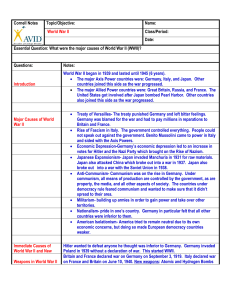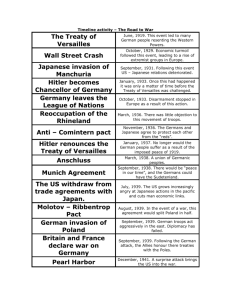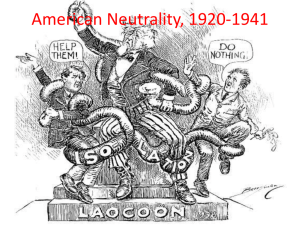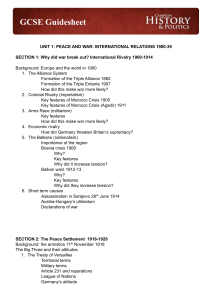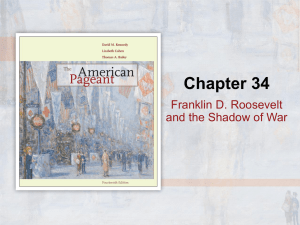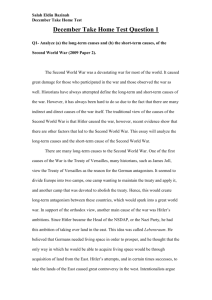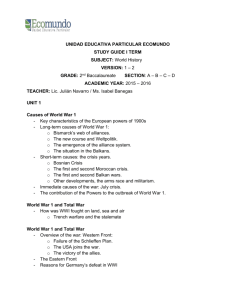Study Guide - TimeLine Theatre Company
advertisement
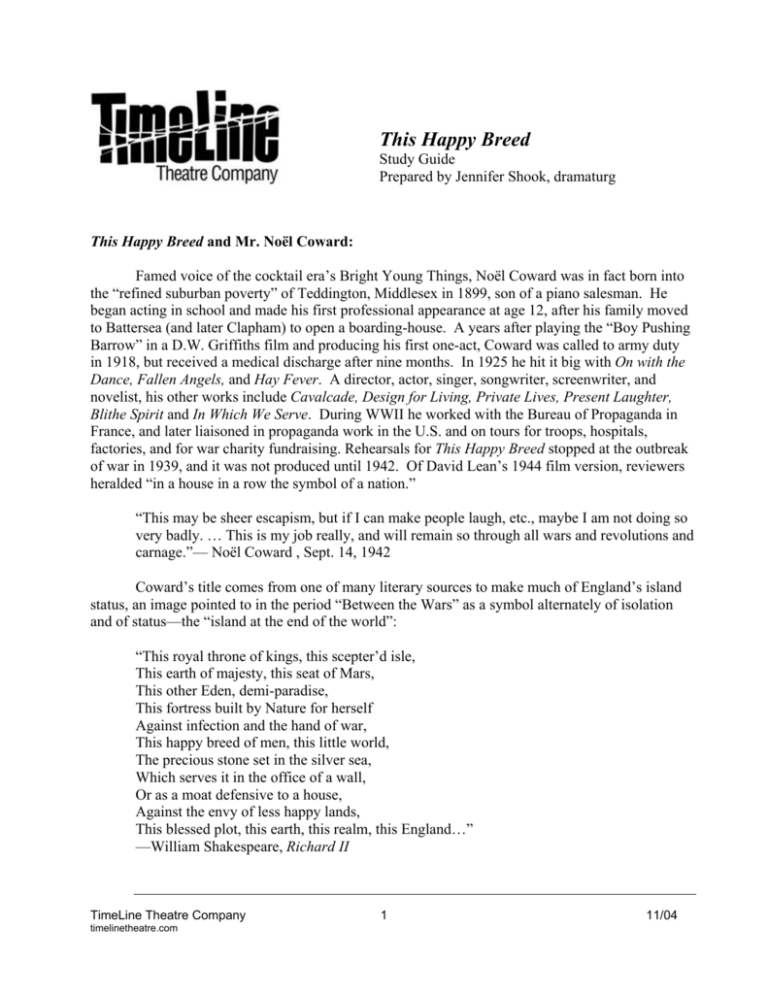
This Happy Breed Study Guide Prepared by Jennifer Shook, dramaturg This Happy Breed and Mr. Noël Coward: Famed voice of the cocktail era’s Bright Young Things, Noël Coward was in fact born into the “refined suburban poverty” of Teddington, Middlesex in 1899, son of a piano salesman. He began acting in school and made his first professional appearance at age 12, after his family moved to Battersea (and later Clapham) to open a boarding-house. A years after playing the “Boy Pushing Barrow” in a D.W. Griffiths film and producing his first one-act, Coward was called to army duty in 1918, but received a medical discharge after nine months. In 1925 he hit it big with On with the Dance, Fallen Angels, and Hay Fever. A director, actor, singer, songwriter, screenwriter, and novelist, his other works include Cavalcade, Design for Living, Private Lives, Present Laughter, Blithe Spirit and In Which We Serve. During WWII he worked with the Bureau of Propaganda in France, and later liaisoned in propaganda work in the U.S. and on tours for troops, hospitals, factories, and for war charity fundraising. Rehearsals for This Happy Breed stopped at the outbreak of war in 1939, and it was not produced until 1942. Of David Lean’s 1944 film version, reviewers heralded “in a house in a row the symbol of a nation.” “This may be sheer escapism, but if I can make people laugh, etc., maybe I am not doing so very badly. … This is my job really, and will remain so through all wars and revolutions and carnage.”— Noël Coward , Sept. 14, 1942 Coward’s title comes from one of many literary sources to make much of England’s island status, an image pointed to in the period “Between the Wars” as a symbol alternately of isolation and of status—the “island at the end of the world”: “This royal throne of kings, this scepter’d isle, This earth of majesty, this seat of Mars, This other Eden, demi-paradise, This fortress built by Nature for herself Against infection and the hand of war, This happy breed of men, this little world, The precious stone set in the silver sea, Which serves it in the office of a wall, Or as a moat defensive to a house, Against the envy of less happy lands, This blessed plot, this earth, this realm, this England…” —William Shakespeare, Richard II TimeLine Theatre Company timelinetheatre.com 1 11/04 World War I: From 1914-1918, the “war of human cost” introduced a number of new atrocities to human vocabulary: submarines (U-Boats and minesweepers lined the English Channel), armored tanks, machine guns, poisonous gas, airplanes, and the hideous waiting game of trench warfare. On the British homefront, sugar and paper were rationed, bombs destroyed houses in Gray’s Inn and Kingsway. Daily casualty lists filled the London papers. In waves of patriotism, entire villages volunteered together to “save the Belgians from the Huns.” The “hollow men” came home, a new brotherhood of those who survived the unspeakable, many getting fitted for prosthetics to cover their gas and shrapnel injuries. They left behind them in the fields of France piles of bones—the fact that Frank Gibbons works in a travel agency selling tours of the battlefields is one of Coward’s many nods to the irony of the new Europe, obsessed with memorializing its “Lost Generation.” World War I had mobilized sixty-five million men: over eight million died, and twenty-one million returned wounded. The flu epidemic also swept the civilian world, and the combination made spiritualism extremely popular. Director Nick Bowling chose to highlight Coward’s connections to specific historical events in the play’s sweep from June 1919-June 1939. So for each of the play’s nine scenes, films explore the history of the intervening years, focusing on ten dates that coincide with the times of the scenes (the tenth, the official start of World War II, following the circular theme of return). Event 1: The Treaty of Versailles (June 28, 1919): Signed at the culmination of the six-month-long Paris Peace Conference, it signaled the official end of World War I. The Treaty forced Germany to accept blame for the war, as well as controversially heavy reparation payments. Radical changes to the national borders of Europe and parts of Asia set in motion the concept of sovereignty that would soon disrupt the colonial empires of all the “Great Powers.” Versailles also provided for the creation of the League of Nations, to publicly arbitrate international conflicts before they lead to war, unlike the secret ententes of the past. “Those five years—1918 to 1923—had been… somehow very important. People looked different. Newspapers seemed different.” –Virginia Woolf, Mrs. Dalloway The art world showed its modernist fragmentation in the machine-minded art of the Vorticist movement, yet centered mostly around Bloomsbury, a neighborhood shared by Virginia Woolf, her sister the painter Vanessa Bell, T.S. Eliot, and John Maynard Keynes, the economist. Yet the discourse of politics followed a newly formulated ideal: democracy. In the geographic realm, sovereignty redrew the maps while the “average person,” the people, the family, took center stage. Mass production and the language of democracy united to level out the social playing field—anybody could wear the latest fashions or sing the latest song, thanks to the new mass media like radio and the new department stores. Every bloke could have an English garden, and in the suburbs, every man’s home was his castle, every woman could aspire to a room of her own. TimeLine Theatre Company timelinetheatre.com 2 11/04 Event 2: Locarno Treaties (Dec. 1, 1925): The western European Allies and the new western European states signed agreements of arbitration and mutual assurance to guarantee their new borders and to reinstate Germany into the family of alliances. The Treaties marked improved diplomacy, though disagreements remained over Germany’s eastern borders with Poland and Czechoslovakia, and tensions persisted in eastern Europe (especially with the left-out USSR). The "spirit of Locarno" was seen in Germany's September 1926 admission to the League of Nations, and in the subsequent withdrawal (completed in June 1930) of Allied troops from Germany's western Rhineland. Aristide Briand called the Locarno Treaties “the draft of the constitution of a European family within the orbit of the League of Nations…the beginning of a magnificent work, the renewal of Europe.” Later the BriandKellogg pact, another one of many new treaties, “outlawed war.” Unfortunately, what Locarno did not answer, the question of Germany’s eastern border, suggested return to great-power diplomacy, and associating peace with democracy would soon mean that an attack on democracy would be an attack on peace. The promise to returning working-class soldiers to a higher-standard of living clashed with the bourgeoisie’s desire to return to pre-war stability. Clashes between labor and capital intensified and inflation doubled. Britain, formerly the largest international investor, was now one of the biggest debtors. Unemployment in London remained high throughout the 1920s, so 1929 found a city already in depression. Event 3: General Strike (May 3-12, 1926): In reaction to a fall in prices largely caused by the import of German reparations coal, mine owners attempted to increase hours and decrease wages. When miners went on a protest strike, the General Council of the Trades Union Congress called out workers in key industries, such as railwaymen, transport workers, printers, dockers and iron and steel workers (fearing that an all out general strike would encourage revolutionary elements). The government managed to ignite public sympathy and get volunteers to fill in, who did not think of themselves as scabs, but merely as patriots. In 1927 the Trade Disputes and Trade Union Act made sympathetic strikes and mass picketing illegal. The Spanish Civil War raged from 1926-1939, resulting in extraordinary loss of life and expressing for much of Europe the clash of worlds between left and right. Germany and Italy supported Franco’s rightwing nationalists, while enormous international (but untrained) volunteer support poured in from the Soviets, France, and England to help the leftist republicans. Event 4: National Government re-election (October, 1931): In August 1931 economic crisis divided the government on the issue of spending cuts. Many Labour ministers resigned, denouncing PM Ramsay MacDonald a “rat” and traitor, while MacDonald formed a “National Government” coalition with Conservative and Liberal Party members. (One flare-up of the financial tensions came in the form of naval mutinies, most famously Invergordon on Sept. 15, 1931, when hundreds of sailors launched a two-day strike in reaction to proposed pay cuts.) The election of MacDonald’s “second National Government” (much more Conservative) in October showed a victory of moderation. TimeLine Theatre Company timelinetheatre.com 3 11/04 Event 5: Japan and China reject League terms for Manchuria (November, 1931): Without recourse to anything but moral sanctions, the League of Nations was powerless to assist China when Japan invaded Manchuria in Sept. 1931 and founded the puppet government of Manchukuo in 1932. Of the major countries only Italy and Germany extended diplomatic recognition. Manchukuo gave the Japanese confidence in their aggression, and served as a major war base. Event 6: Assassinations and Military Maneuvers (May 1932): Eruptions continued not only in the starving countries, new countries, or the prime sites of civil war. On May 6, 1932, French president Paul Doumer was assassinated. On May 15, Japan’s party system suffered a final blow before giving in to the military state when eleven young Japanese naval officers attempted a coup d’état, killing Prime Minister Inukai Tsuyoshi. In full control of Japan, the military renewed the attack on Shanghai. Event 7: Abdication (Dec. 11, 1936): Edward VIII left the throne in order to marry the American divorcée Mrs. Wallis Simpson, inciting a constitutional crisis and much scandal. As de jure head of the Church of England, the king had to recognize the Church’s prohibition of remarriage after divorce. Strong voices of the state (namely PM Stanley Baldwin) presented many alternatives to marriage, which the king refused. Officially, Edward was the first British monarch to voluntarily abdicate. Event 8: Munich Agreement (September 29, 1938): After Hitler’s Anschluss annexation of Austria in March 1938, German eyes turned toward the strongly German population of Czechoslovakia's Sudetenland. Bound to the Czechs but unprepared for war, the Great Powers mobilized for the first time since 1919. Hitler as well as France and Britain overestimated German military strength. At first it seemed that the lesson of WWI had been not to jump too quickly in line of the dominoes of deadly alliances. Horrified by the results of nationalism, millions turned to pacifism, hoping to avoid further loss. In a desperate attempt to avoid a seemingly unavoidable war, Neville Chamberlain, Edouard Daladier and Benito Mussolini convinced Hitler to conference in Munich, where they negotiated the Munich Agreement, giving Germany control over the Sudetenland in exchange for Hitler’s promise to not press past Czechoslovakia. Though Chamberlain cried out “Peace with honour… Peace in our time” at the Heston Airport upon his return, many were infuriated by the pact, including not only Czechoslovakia, but Hitler (not fond of playing the bourgeois politician), and Stalin, who watched the West sell out an ally, and in fear switched from an anti-fascist alliance with the British and French to a pact with the Nazis, the Molotov-Ribbentrop Pact in 1939. Kristallnacht began to wake the British from what George Orwell called their “deep, deep sleep.” On Nov. 9-10, 1938 German and Austrian Jews suffered vandalization of over one billion marks on the “Night of Broken Glass.” Event 9: The Axis Forms: The Pact of Steel (May, 1939): As the Spanish Civil War ground to a close in 1939, Franco and his Falange party took total control of Spain, and Germany and Italy cemented their shaky alliance in May with the Pact of Steel to take control of the area’s resources, a mere two weeks after announcing the “Rome-Berlin Axis.” TimeLine Theatre Company timelinetheatre.com 4 11/04 Event 10: German Invasion of Poland: On Sept. 1, 1939 Germany invaded Poland, and on Sept. 3, Britain (and France, six hours later) declared war on Germany. The Island left its still point to rejoin the stream. 1919-1939: The Center (Cannot Hold): Nov 11, 1918 World War One ends with German defeat. January 18, 1919 WW I Peace Congress opens in Versailles, France April 13, 1919 British forces kill 100s of Indian Nationalists (Amritsar Massacre) May 3, 1919 Afghanistan begins war against Great Britain June 28, 1919 Signing of the Treaty of Versailles. January 16, 1920 First assembly of League of Nations (Paris) April 24, 1920 British Mandate over Palestine goes into effect (lasts 28 years) March 1, 1921 Rwanda ceded to England March 17, 1921 Dr Marie Stopes opens Britain's First birth control clinic (London) March 17, 1921 Lenin proclaims New Economic Politics April 15, 1921 Black Friday- Labour Party strike of mine workers fails May 27, 1921 After 84 years of British control, Afghanistan achieves sovereignty October 4, 1921 League of Nations refuses to assist starving Russians December 6, 1921 Anglo-Irish Treaty: Ireland now dominion; Northern Ireland created February 2, 1922 James Joyce's Ulysses published in Paris (1,000 copies) February 15, 1922 Marconi begins regular broadcasting radio transmissions from Essex February 28, 1922 Egypt regains independence from Britain, but British troops remain April 3, 1922 Stalin appointed General Secretary of Communist Party April 16, 1922 German-Russia treaty signed in Italy, Soviet Union recognized March 31, 1924 London public transport strike ends April 18, 1924 First crossword puzzle book published (Simon & Schuster) June 15, 1924 Native Americans are proclaimed US citizens January 3, 1925 Mussolini dissolves Italian parliament/becomes dictator April 3, 1925 Great Britain goes back to gold standard April 21, 1925 Noel Coward's Fallen Angels premieres in London July 18, 1925 Hitler publishes Mein Kampf February 25, 1926 Francisco Franco becomes General of Spain March 7, 1926 First transatlantic telephone call (London-NY) TimeLine Theatre Company timelinetheatre.com 5 11/04 May 3-12, 1926 British general strike-3 million workers support miners August 3, 1926 Traffic lights installed on Piccadilly Circus September 8, 1926 League of Nations Assembly votes unanimously to admit Germany January 10, 1927 Fritz Lang's Metropolis premieres April 12, 1927 Chiang Kai-shek begins Shanghai counter-revolution after British leave May 20, 1927 Saudi Arabia becomes independent of Great Britain (Treaty of Jedda) May 21, 1927 Lindbergh lands in Paris after First solo air crossing of Atlantic December 14, 1927 Iraq gains independence from Britain, but British troops remain May 7, 1928 England lowers age of women voters from 30 to 21 June 11, 1928 Alfred Hitchcock's First film, Case Of Jonathan Drew is released June 18, 1928 Amelia Earhart becomes First female to fly across Atlantic Ocean August 27, 1928 Kellogg-Briand Pact: 60 nations agree to “outlaw war” September 15, 1928 Alexander Fleming discovers penicillin October 29, 1929 "Black Tuesday," Stock Market crashes triggers Great Depression November 18, 1929 Stalin routes troops to Manchuria November 20, 1929 Salvador Dali's first one-man show March 12, 1930 Gandhi begins 200-mile march protesting British salt tax in India September 10, 1931 Lord Cecil says “War was never so improbable” September 15, 1931 British naval fleet mutinies at Invergordon over pay cuts September 19, 1931 Japanese troops conquer Mukden, South Manchuria September 21, 1931 Britain abandons gold standard/pound devalues 20% November 7, 1931 Chinese People's Republic proclaimed by Mao Tse Tung December 11, 1931 Statute of Westminster gives legislative independence to Canada, Australia, NZ, South Africa, Ireland, Newfoundland May 9, 1932 Piccadilly Circus lit by electricity August 22, 1932 BBC begins experimental regular TV broadcasts August 27, 1932 200,000 English textile workers strike December 21, 1932 Fred Astaire & Ginger Rogers pair up in Flying Down to Rio February 2, 1933 2 days after becoming chancellor, Adolf Hitler dissolves Parliament February 22, 1933 Goering forms SA/SS-police, shoots 40-50 February 24, 1933 League of Nations tells Japan to pull out of Manchuria February 27, 1933 Nazis set fire to Reichstag, blame it on Communists March 12, 1933 First concentration camp completed TimeLine Theatre Company timelinetheatre.com 6 11/04 October 14, 1933 Nazi Germany announces withdrawal from League of Nations June 30, 1934 "Night of Long Knives," Hitler stages bloody purge of Nazi party August 19, 1934 Hitler elected Fuhrer (95.7% of German voters) September 17, 1934 USSR joins League of Nations January 14, 1935 Oil pipeline Iraq-Mediterranean goes into use March 16, 1935 Hitler introduces military conscription, violating Treaty of Versailles July 30, 1935 First Penguin book is published, starting the paperback revolution September 15, 1935 Nuremberg Laws deprive Jews of citizenship & officialize swastika October 2, 1935 Mussolini's Italian army attacks Abyssinia (Ethiopia) November 1, 1935 TS Eliot's Murder in the Cathedral premieres in London March 7, 1936 Hitler breaks Treaty of Versailles again by sending troops to Rhineland July 18, 1936 Spanish Civil War begins, Gen Francisco Franco leads uprising November 12, 1936 First TV gardening show December 11, 1936 King Edward VIII abdicates throne to marry Mrs. Wallis Simpson April 26, 1937 German Luftwaffe destroys Basque town of Guernica in Spain May 6, 1937 Dirigible Hindenburg explodes in flames at Lakehurst, NJ (36 die) September 21, 1937 JRR Tolkien publishes The Hobbit November 9, 1937 Japanese army conquers Shanghai November 17, 1937 Britain’s Lord Halifax visits Germany, beginning of appeasement December 11, 1937 Italy withdraws from League of Nations March 12, 1938 Nazi Germany invades Austria, announces Anschluss (union) June 6, 1938 Sigmund Freud arrives in London July 24, 1938 Instant coffee invented September 29, 1938 Treaty of Munich gives eastern Czechoslovakia to Germany October 15, 1938 German troops occupy the Sudetenland; Czech government resigns November 9-10, 1938 Nazi Kristallnacht (The Night of Broken Glass) January 22, 1939 Uranium atom First split, Columbia University January 30, 1939 Hitler calls for extermination of European Jews March 15, 1939 Hitler occupies Bohemia & Moravia (Czechoslovakia) March 28, 1939 Spanish Civil War ends, Madrid falls to Francisco Franco March 31, 1939 Britain & France agree again to support Poland if invaded by Germany April 7, 1939 Italy invades Albania May 22, 1939 Hitler & Mussolini sign Pact of Steel TimeLine Theatre Company timelinetheatre.com 7 11/04 August 23, 1939 Molotov-Ribbentrop pact: East Europe divided between Hitler & Stalin August 27, 1939 Nazi Germany demands Danzig & Polish corridor August 31, 1939 British fleet mobilizes; civilian evacuations begin from London. September 1, 1939 Hitler orders extermination of mentally ill September 1, 1939 Last day of First-class cricket in England for 6 years September 1, 1939 Germany invades Poland, takes Danzig September 3, 1939 Britain declares war on Germany. France follows 6 hours later September 6, 1939 First German air attack on Great-Britain in WW II September 17, 1939 Russia invades Eastern Poland, takes 217,000 Poles prisoner September 25, 1939 Andorra, left out of Versailles Treaty, signs treaty ending WW I September 27, 1939 Warsaw Poland surrenders to Germans after 19 days of resistance October 11, 1939 Albert Einstein informs FDR of possibilities of atomic bomb Sources and Further Reading Suggestions: Ackroyd, Peter. London: The Biography. NY: Anchor Books, 2003. Blythe, Ronald. The Age of Illusion: England in the Twenties and Thirties: 1919-1940. Boston: Houghton Mifflin Company, 1964. Bull, Stephen. World War I: Trench Warfare (2002) 1916-1918. Oxford: Osprey Publishing, 2002. Charmley, John. Chamberlain and the Lost Peace. Chicago: Ivan R. Dee, Publisher, 1989. Clarke, P.F. Hope and Glory: Britain 1900-1990. London : Allen Lane, The Penguin Press, 1996. Cowie, L.W. A Dictionary of British Social History. London: G. Bell & sons Ltd., 1973. Daniel, Clifton. Twentieth Century Day-by-Day. NY: DK Publishing, 1999. Dixon, Wheeler Winston, ed. Re-envisioning British Cinema, 1900-1992. Albany, NY: State University of New York Press, 1994. Gatzke, Hans W., ed. European Diplomacy Between Two Wars, 1919-1939. Chicago: Quadrangle Books, 1972. Gopnick, Adam. “The Big One: Historians Rethink the War to End All Wars,” New Yorker, Aug. 23, 2004. Haigh, Christopher, ed. The Cambridge Historical Encyclopedia of Great Britain and Ireland. Cambridge: Cambridge University Press, 1985. Heyman, Neil M. Daily Life During World War I. Westport, CT: Greenwood Press, 2002. Hoare, Philip. Noël Coward: A Biography. Chicago : University of Chicago Press, 1998. Kitchen, Martin. Europe Between the Wars: A Political History. London: Longman Group UK Ltd., 1988. Knoles, George H. and Rixford K. Snyder, eds. Readings in Western Civilization. Chicago: J.B. Lippincott Company, 1951. TimeLine Theatre Company timelinetheatre.com 8 11/04 Lamb, Richard. The Drift to War: 1922-1939. NY: St. Martin’s Press, 1989. Laver, James. Between the Wars. Boston, Houghton Mifflin, 1961. Marwick, Arthur. Britain in Our Century: Images and Controversies. NY: Thames & Hudson, 1984. Mazower, Mark. Dark Continent: Europe’s Troubled Century. NY: Alfred A. Knopf, 1999. The Oxford Minidictionary of Twentieth-Century World History. NY: Oxford University Press, 1990. Payn, Graham and Sheridan Morley, eds. The Noël Coward Diaries. London: Phoenix Press, 1982. Rowse, A. L. The Illustrated History of Britain. NY: Crescent Books 1979. Russell, Jacqui, ed. File on Coward. NY: Methuen, 1987. Schama, Simon. A History of Britain. . NY: Hyperion, 2000. Simkins, Peter. The First World War: The Western Front 1914-1916. Oxford: Osprey Publishing, 2002. Smith, Godfrey. The English Companion: An Idiosyncratic Guide to England and Englishness from A to Z. NY: Clarkson N. Potter, Inc, 1984. Thackeray, Frank W. and John E. Findling, eds. Events That Changed the World in the Twentieth Century. Westport, CT: Greenwood Press, 1995. Warner, Marina. The Crack in the Teacup: Britain in the 20th Century. NY: Houghton Mifflin, 1979. Warwick, Christopher. Abdication. London: Sidgwick & Jackson, 1986. Websites: Betts, Raymond F. Europe in Retrospect: A Brief History of the Past Two Hundred Years. Britannia.com, LLC, 2000. http://www.britannia.com/history/euro/3/1_1.html Brainy History. BrainyMedia.com, 2004. www.brainyhistory.com Duffy, Michael. First World War.com, 2004. www.firstworldwar.com Kenrick, John. “Noël Coward,” Musicals 101.com. www.musicals101.com Reality Film: Documentary Resources & Reviews. 2003. http://www.realityfilm.com/study/history/1930-1939.htm Wikipedia: The Free Encyclopedia. www.wikipedia.org TimeLine Theatre Company timelinetheatre.com 9 11/04
